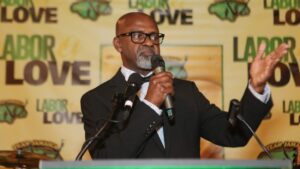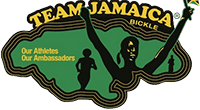
Children First Executive Director Claudette Richardson-Pious expresses thanks to Carlton Stewart (second left) after he presented her with a cheque valued at US$2,500, donated by his sister, Vivienne Stewart-Seaton, last week. The money represented what Stewart-Seaton’s company in the US would have spent on a retirement party for her. Sharing the occasion are Team Jamaica Bickle CEO Irwine Clare (right) and Young Caribbean Professional Network President Blane Stoddart. (Photo: Joseph Wellington)
A Jamaican woman who has been living and working in the United States for many years has made the first gesture in what Team Jamaica Bickle (TJB) hopes will mushroom into a huge avenue through which funds from the diaspora can be contributed to needy charitable organisations here.
Last week Monday, Vivienne Stewart-Seaton’s brother, Carlton, presented a cheque valued at US$2,500 to Children First Executive Director Claudette Richardson-Pious. The money was what Bristol-Myers Squibb — a global BioPharma company — would have spent to throw Stewart-Seaton a retirement party in February this year.
“My sister decided that instead of the company using the money that way, she wanted to give it to a charitable organisation in Jamaica,” Carlton Stewart told the Jamaica Observer, where he handed over the cheque.
Stewart, who runs his own company in Spanish Town, explained that when his sister contacted him and told him what she wanted to do, he recommended that Children First be the beneficiary as he was familiar with the work being done by the charity in that town.
“It is a great idea, something that is very useful, and we can use that because it has the potential to raise millions of dollars for charity,” added Stewart, who pointed out that his sister will soon be moving from New York to Florida.
Team Jamaica Bickle CEO Irwine Clare agreed.
“This represents a new dimension of sourcing external funding for charities here in Jamaica, because if people in the diaspora realise that instead of their companies throwing them a retirement party and giving them a gift, they donate that money to a charity in Jamaica, it can go a far way in alleviating some of the challenges that these charities face,” he said.
Clare explained that TJB’s role in the gesture was basically that of a surrogate, meaning that its tax-exempt status as a 501(c)(3) non-profit organisation allowed for the funds to be channelled through TJB to Children First.
According to the United States Internal Revenue Service, “to be tax-exempt under section 501(c)(3) of the Internal Revenue Code, an organisation must be organised and operated exclusively for exempt purposes set forth in section 501(c)(3), and none of its earnings may inure to any private shareholder or individual. In addition, it may not be an action organisation, ie, it may not attempt to influence legislation as a substantial part of its activities and it may not participate in any campaign activity for or against political candidates.”
Clare explained that when Richardson-Pious reached out to him for assistance, he agreed to help because TJB had done this before.
Richardson-Pious said when Stewart contacted her and told her of his sister’s desire, she was moved because it signalled to her that there is still hope.
“I’m very excited. It’s a weird time in the organisation because the pie is shrinking. Jamaica is now considered an upper middle-income country, so some of our funding has almost disappeared. So it means looking at other creative ways of finding resources,” said Richardson-Pious, who co-founded Children First in 1997 after Save the Children UK, which began operation in 1989, was phased out.
Children First, a non-governmental organisation based in Spanish Town, St Catherine, explains on its website that it “uses creative participatory and developmental approaches in providing life-changing programmes for children and adolescents”.
Expressing gratitude for the donation, Richardson-Pious said it “speaks to the fact that our work has impacted, because the fact that he (Stewart) could remember us and tell his sister that this is where the money should go is important for me”.
Added Richardson-Pious: “We do as best we can with the little we have, and we will continue to do so. We are 21 years [old] and we’re struggling, but not closing. We’re steadfast on making a difference because that’s our mission.”
Blane Stoddart, president of Young Caribbean Professional Network — an organisation which states that it is dedicated to creating access to education and economic opportunities for students and young professionals in the global marketplace — pointed to multiplier effect of donations similar to Stewart-Seaton’s.
“This party was not that big, because the average party runs US$5,000. What if 10, 20, 30 people who are from Jamaica donated some money to a charity in Jamaica? Just think of the significant financial impact that would have on organisations,” he said.
Added Clare: “When you do the math on that, a lot of us work for companies and will be retiring soon, so it’s an avenue that we need to encourage. That’s why we were very happy to participate in this and at the same time to bring awareness to the other 501(c)(3) organisations that do a lot of work on behalf of Jamaica; that as we seek new sources of funds — because our sponsors are fatigued — these are the creative ideas that we have to approach.”
Source: Jamaica Observer





